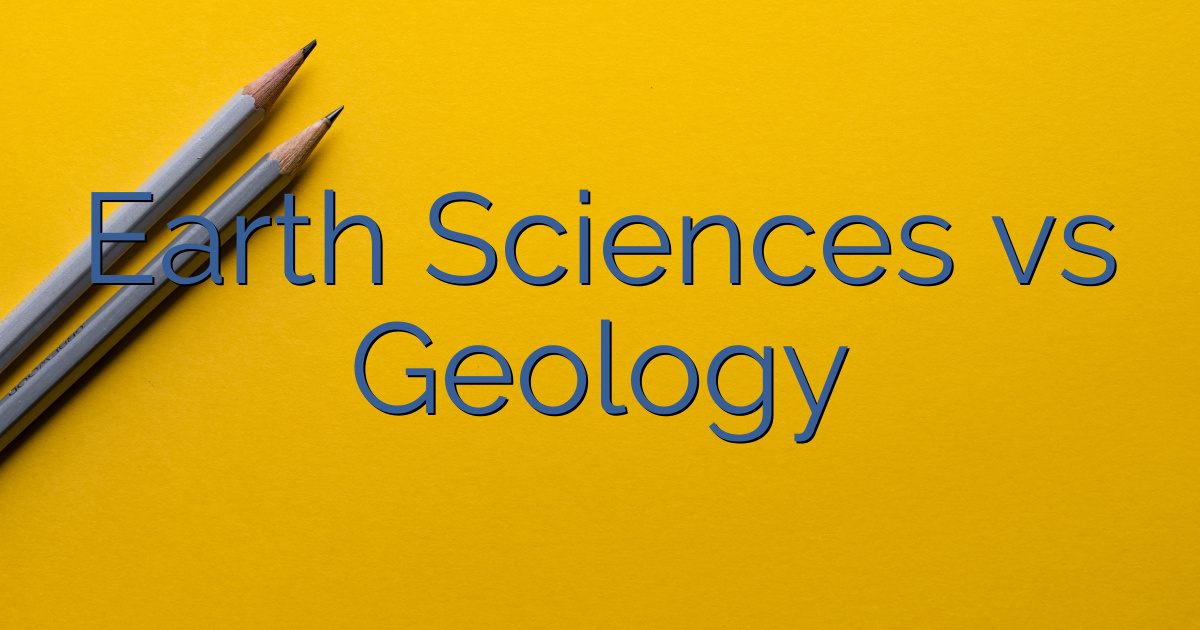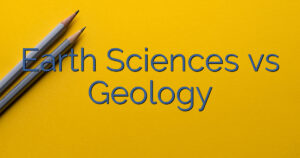 Are you torn between the mysterious world beneath our feet? Earth Sciences vs. Geology – the battle of the rocks and the study of our planet.
Dive into the depths of this article as we compare and contrast these two majors. From the curriculum to the career opportunities, we’ll explore the similarities and differences between Earth Sciences and Geology.
So, buckle up and get ready to embark on a journey through the earth’s secrets and uncover which path is best suited for you.
Are you torn between the mysterious world beneath our feet? Earth Sciences vs. Geology – the battle of the rocks and the study of our planet.
Dive into the depths of this article as we compare and contrast these two majors. From the curriculum to the career opportunities, we’ll explore the similarities and differences between Earth Sciences and Geology.
So, buckle up and get ready to embark on a journey through the earth’s secrets and uncover which path is best suited for you.
Table of Contents
Key Takeaways – Earth Sciences vs Geology
- Earth Sciences encompass the study of the atmosphere, hydrosphere, biosphere, and geosphere, while Geology focuses specifically on the study of the Earth’s solid materials, such as rocks and minerals.
- Earth Sciences offer research opportunities in climate science, oceanography, and ecology, while Geology specializes in the processes that shape the Earth’s structure.
- Both disciplines involve fieldwork to apply knowledge and collect data, including opportunities to study geological formations, collect samples, and analyze data.
- Earth Sciences and Geology both provide promising career prospects in research and environmental consulting, with Geology having a higher growth rate and higher salaries due to its applications in mining, oil and gas exploration, and environmental consulting.
Overview of the two majors: Earth Sciences and Geology disciplines
If you’re deciding between the Earth Sciences and Geology disciplines, it’s important to understand the differences and similarities between the two majors. When it comes to research opportunities, both Earth Sciences and Geology offer a wide range of possibilities. However, there are some key distinctions. Earth Sciences encompass a broader scope, including the study of the atmosphere, hydrosphere, and biosphere, in addition to the geosphere. This interdisciplinary approach opens up research opportunities in fields like climate science, oceanography, and ecology. Geology, on the other hand, focuses specifically on the study of the Earth’s solid materials, such as rocks, minerals, and the processes that shape the planet’s structure. Fieldwork is crucial in both disciplines, allowing students to apply their knowledge in real-world settings, collect data, and make observations. Whether you choose Earth Sciences or Geology, fieldwork will provide valuable experiences and skills for your future career.Overview of the curriculum and courses of the two majors
The overview of the curriculum and courses for the two majors can be found on their respective department websites. When comparing the coursework assessment for Earth Sciences and Geology, there are several key differences to consider:- Earth Sciences:
- Core courses in earth system science, geological processes, and environmental geology.
- Emphasis on interdisciplinary studies, integrating chemistry, physics, and biology.
- Fieldwork opportunities to study geological formations, collect samples, and analyze data.
- Geology:
- Core courses in mineralogy, petrology, and structural geology.
- Focus on the study of rocks, minerals, and the Earth’s structure.
- Fieldwork opportunities to conduct geological surveys, map rock formations, and analyze geological structures.
Overview of coursework, assessments, and fieldwork
When comparing the coursework and fieldwork opportunities of the two majors, there are notable differences to consider. In the earth sciences major, the coursework assessment primarily focuses on theoretical knowledge and scientific principles. Students are evaluated through examinations, research papers, and project presentations, which gauge their understanding of geological processes, mineralogy, and environmental geosciences. On the other hand, in the geology major, while there is a similar emphasis on theoretical knowledge, there is also a strong emphasis on fieldwork evaluation. Geology majors are required to participate in field trips, where they apply their knowledge to real-world geological scenarios, collect samples, and conduct hands-on experiments. These field experiences are then assessed through field reports and practical examinations, ensuring students develop practical skills in geological mapping, rock identification, and data interpretation. Overall, the coursework assessment and fieldwork evaluation in the two majors provide distinct approaches to learning and skill development in the earth sciences and geology disciplines.Comparison of Skills Developed in Earth Sciences and Geology Disciplines
One notable difference between the two majors is the emphasis on theoretical knowledge in the coursework assessment of the earth sciences major. The geology major, on the other hand, places a strong emphasis on fieldwork evaluation. In terms of skills comparison, the earth sciences major focuses on developing a deep understanding of the fundamental principles and theories governing the Earth’s processes and systems. This includes skills such as data analysis, modeling, and interpretation of geological phenomena. On the other hand, the geology major hones practical skills required for fieldwork, such as geological mapping, sample collection, and site characterization. These skills are essential for conducting field surveys, analyzing rock formations, and identifying mineral resources. When it comes to job prospects, the earth sciences major offers opportunities in research, environmental consulting, and resource management. The geology major, on the other hand, opens doors to careers in oil and gas exploration, mining, and geotechnical engineering.Comparison of Career Opportunities and Job Roles in Earth Sciences and Geology Disciplines
If you’re considering a career in either of these disciplines, it’s important to understand the different job opportunities and roles available within each field. In the field of earth sciences, career prospects are diverse and wide-ranging. You could choose to work as an environmental scientist, studying the impact of human activities on the environment and developing strategies for sustainable resource management. Alternatively, you could pursue a career as a climatologist, analyzing weather patterns and studying the effects of climate change. In contrast, geology offers career opportunities in areas such as petroleum exploration, mining, and environmental consulting. As a geologist, your job responsibilities may include conducting field surveys, analyzing rock samples, and interpreting geological data to assess the feasibility of mining operations or the potential for oil and gas extraction. Understanding the different career prospects and job responsibilities in each field can help you make an informed decision about your future career path.Comparison of Salary Potential: Job Market Trends
The salary potential and job market trends differ between the disciplines of earth sciences and geology. When it comes to job market growth, both fields have seen a steady increase in demand over the past decade. However, geology has witnessed a higher growth rate due to its applications in industries like mining, oil and gas exploration, and environmental consulting. In terms of salary potential, geologists tend to earn higher salaries compared to professionals in earth sciences. This is mainly because of the specialized skills and knowledge required in geology, as well as the industries it serves. To illustrate the salary differences, here is a table showcasing the average salaries for different roles in both disciplines:| Role | Earth Sciences (Average Salary) | Geology (Average Salary) |
|---|---|---|
| Environmental Scientist | $65,000 | $75,000 |
| Geophysicist | $80,000 | $90,000 |
| Hydrologist | $70,000 | $80,000 |
| Paleontologist | $75,000 | $85,000 |
| Seismologist | $85,000 | $95,000 |
Similarities between Earth Sciences and Geology disciplines
Both disciplines have a strong emphasis on studying the Earth and its processes. The similarities between earth sciences and geology disciplines are evident in their shared focus on understanding the Earth’s structure, composition, and natural phenomena. Here are four key similarities between these disciplines:- Both earth sciences and geology disciplines explore the Earth’s physical properties, such as its rocks, minerals, and landforms.
- Both disciplines investigate the processes that shape the Earth, including plate tectonics, erosion, and volcanic activity.
- Fieldwork plays a crucial role in both earth sciences and geology studies, allowing researchers to observe and collect data directly from the natural environment.
- Both disciplines contribute to our understanding of Earth’s history, helping us reconstruct past events through the analysis of geological evidence.
Difference between Earth Sciences and Geology disciplines
To understand the difference between earth sciences and geology, you need to recognize their distinct areas of focus and research. Geology primarily concentrates on the study of the solid materials that make up the Earth, such as rocks, minerals, and the processes that shape them. It delves into the Earth’s history, examining the formation of mountains, the movement of tectonic plates, and the evolution of landscapes. On the other hand, earth sciences encompass a broader scope, incorporating geology along with other disciplines like meteorology, oceanography, and environmental science. Earth sciences explore the interactions between the Earth’s various systems, including the atmosphere, hydrosphere, biosphere, and lithosphere. This difference in research focus presents the potential for interdisciplinary study within the field of earth sciences, encouraging collaboration between experts from different disciplines to gain a comprehensive understanding of our dynamic planet.What is the Difference Between Earth Science and Geology?
Earth science and geology are closely related but have distinct differences. Geology focuses on the study of the Earth’s materials, while earth science encompasses all sciences related to the Earth. The earth science comparison geology sciences shows how they overlap and complement each other in understanding our planet.

